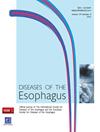25. THE ROLE OF ADJUVANT THERAPY FOR PATIENTS WITH ESOPHAGEAL ADENOCARCINOMA UNDERGOING NEOADJUVANT THERAPY AND ESOPHAGECTOMY
IF 2.3
3区 医学
Q3 GASTROENTEROLOGY & HEPATOLOGY
引用次数: 0
Abstract
The use of adjuvant therapy after neoadjuvant therapy followed by esophagectomy is controversial due to limited studies. The aim of this study was to investigate the role of adjuvant therapy for patients with esophageal adenocarcinoma (EAC) after neoadjuvant therapy and esophagectomy and to provide a basis for clinical decision-making. Patients who were diagnosed as EAC and underwent neoadjuvant therapy followed by surgery were included in this study. The data of the patients in training group are derived from Surveillance, Epidemiology, and End Results (SEER) database. Patients from two institutions (West China Hospital and Nanjing Jinling Hospital) were used to validate the results. A total of 3445 EAC patients were identified from the SEER database according to the eligibility criteria. No significant difference was found between adjuvnat therapy and non-adjuvant therapy group (5-year overall survival (OS): 35.7 and 37.2%, p = 0.920; 5-year cancer-specific survival (CSS): 39.5 and 43.2%, p = 0.520). Meanwhile, 130 patients were identified from West China Hospital (n = 84) and Jinling Hospital (n = 46). The results showed that patients undergoing adjuvant therapy group had a better OS than non-adjuvant therapy group (p = 0.031). On the basis of the SEER database, this study revealed no survival benefit of adjuvant therapy for patients with EAC after neoadjuvant therapy and surgery. However, the analysis results of patients from two institutions in China show that patients with EAC may benefit from adjuvant therapy after neoadjuvant therapy and esophagectomy.25. 辅助治疗在食管腺癌新辅助治疗及食管切除术患者中的作用
由于研究有限,在食管切除术后使用新辅助治疗是有争议的。本研究旨在探讨食管腺癌(EAC)患者在新辅助治疗和食管切除术后的辅助治疗作用,为临床决策提供依据。本研究纳入了被诊断为EAC并在手术后接受新辅助治疗的患者。训练组患者的数据来源于监测、流行病学和最终结果(SEER)数据库。来自两个机构(华西医院和南京金陵医院)的患者被用来验证结果。根据资格标准,共从SEER数据库中确定了3445名EAC患者。佐剂治疗组和非佐剂治疗组之间没有发现显著差异(5年总生存率:35.7%和37.2%,p = 0.920;5年癌症特异性生存率(CSS)分别为39.5%和43.2%,p = 0.520) = 84)和金陵医院(n = 46)。结果表明,接受辅助治疗的患者OS优于非辅助治疗组(p = 0.031)。基于SEER数据库,本研究显示,辅助治疗对EAC患者在新辅助治疗和手术后的生存没有益处。然而,来自中国两个机构的患者分析结果表明,EAC患者在新辅助治疗和食管切除术后可能受益于辅助治疗。
本文章由计算机程序翻译,如有差异,请以英文原文为准。
求助全文
约1分钟内获得全文
求助全文
来源期刊

Diseases of the Esophagus
医学-胃肠肝病学
CiteScore
5.30
自引率
7.70%
发文量
568
审稿时长
6 months
期刊介绍:
Diseases of the Esophagus covers all aspects of the esophagus - etiology, investigation and diagnosis, and both medical and surgical treatment.
 求助内容:
求助内容: 应助结果提醒方式:
应助结果提醒方式:


